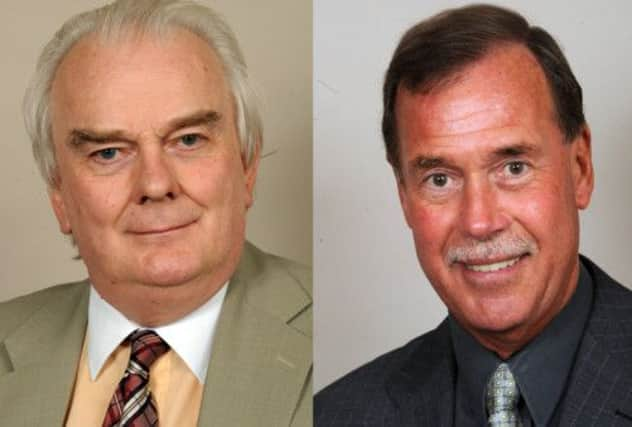Labour suspend two peers pending lobbying inquiry


Footage appeared to show the peers offering to lobby ministers or host functions at the House of Lords, despite rules forbidding them from seeking profit from their positions.
Former Cabinet minister Lord Cunningham and former senior police officer Lord Mackenzie of Framwellgate were suspended by Labour after being recorded by undercover reporters posing as lobbyists. A third peer, Lord Laird, resigned the UUP whip yesterday after being targeted in the same investigation.
Advertisement
Hide AdAdvertisement
Hide AdAll three deny having breached the rules and havereferred themselves to the House of Lords Commissioner for Standards.
The latest scandal came just two days after MP Patrick Mercer quit the Conservative whip over lobbying allegations, referred himself to the Commons sleaze watchdog and announced he would not stand for parliament in 2015.
Labour said in a statement yesterday that Lords Cunningham and Mackenzie had been suspended “pending further
investigation”.
The party added: “The Labour Party expects the highest standards of its representatives and believes that they have a duty to be transparent and accountable at all times.”
Lord Cunningham insisted the report of his meeting with the bogus lobbyists was “misleading” and that he was taking legal advice. He is alleged to have offered to ask parliamentary questions on behalf of the firm and take concerns directly to the Prime Minister.
Recordings appear to show him asking for £12,000 a month rather than the offered £10,000, and saying he offered “value for money” because of his access to senior figures.
The peer, who was an MP for 22 years as Jack Cunningham and served in Tony Blair’s cabinet, insisted he had been testing his suspicions that he was being targeted by a scam.
“I told the undercover journalists that I always stick to the rules and declare any interests,” he said. “The article also fails to properly acknowledge the important fact that I informed them the next day that I wanted nothing more to do with them.”
Advertisement
Hide AdAdvertisement
Hide AdThe Sunday Times reported that the peers had made it clear to undercover reporters that they would have to declare any money they were paid.
But it said there were discussions of ways to get around declaration of interest rules by asking colleagues to table questions and host events.
Lord Laird said he had “not broken any rules”.
“I did not agree to act as a paid advocate in any proceedings of the House nor did I accept payment or other incentive or reward in return for providing parliamentary advice or services,” he said in a statement.
Lord Mackenzie, the former president of the Police Superintendents Association, also denied any wrongdoing.
The Sunday Times reported that he explained he had “devised a ruse” that allowed him to host events for paying clients, by asking colleagues to hold them for him. The paper also alleged he was happy to ask questions and approach ministers in the Lords to “bend their ear”.
Lord Mackenzie conceded that “morally it may well look as though it’s not right”, but defended his comments about switching event hosts.
“It’s a very complex area, but I made sure I knew the rules before I went into any of this and it’s an important thing to do, obviously, because what we don’t want is parliamentarians breaking the rules.
“But there may well be case for changing them.”
Cabinet Office minister Francis Maude expressed confidence that lobbying reform would proceed before the election, as Labour demanded urgent cross-party talks on the stalled introduction of a register.
David Cameron warned in 2010 that lobbying was the “next big scandal waiting to happen” and changes were promised in the coalition agreement. However, there has been no sign of legislation.